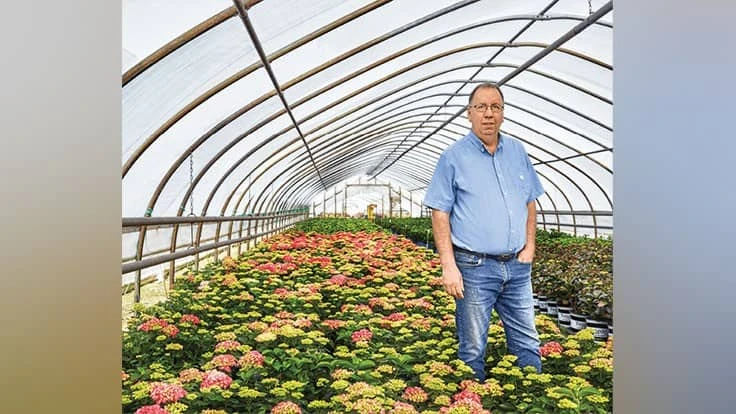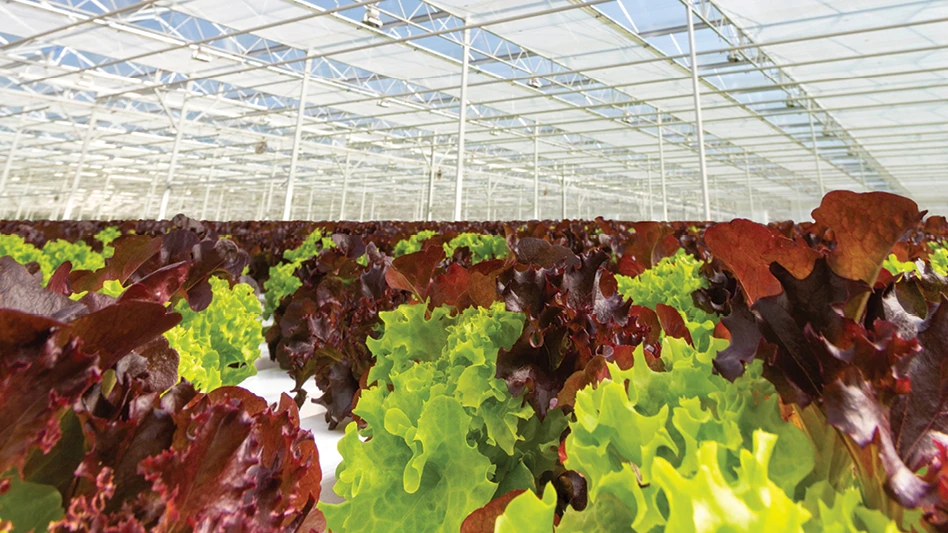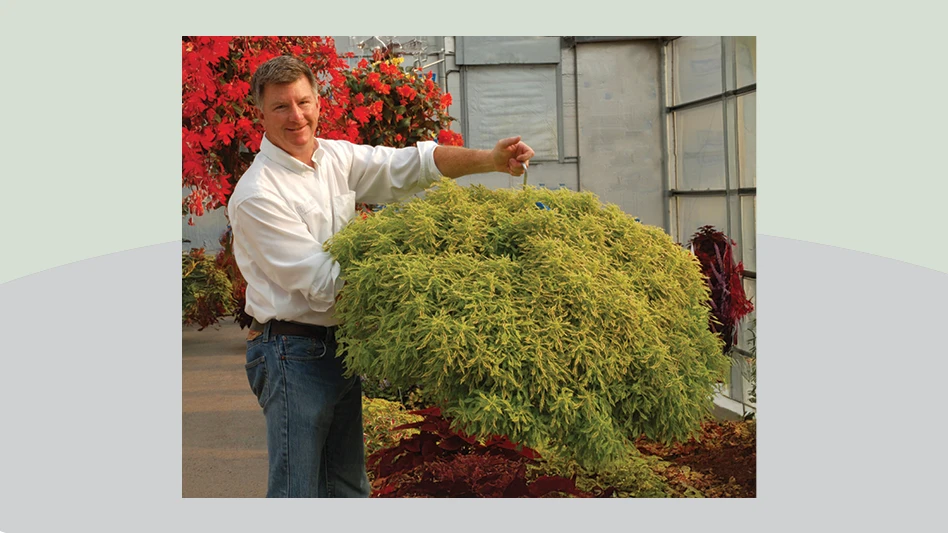


Bill Zalakar has always been a self-starter. At the age of 10, he was ordering seeds and planting vegetables, and by the time he was 14, he was hauling hundreds of pounds of tomatoes to the local grocery stores to make a little bit of money. He ended up being so successful that he paid most of his way through college.
He learned early on that for some things, you have to rely on Mother Nature, but his long-term goal was to find something he could have a little more control over.
Bill was lucky enough to live right beside a large greenhouse company called Johnson Florists in Pittsburgh. So, at 16, he applied for a job and applied again, and again, and again. Finally, the company told him that if he would work the night shift helping with the boilers, they would let him do a little greenhouse work.
He jumped at the chance and landed his first job in horticulture. “I always knew that’s what I wanted,” Bill says. From there, he went on to study horticultural business at Penn State.
After founding his own successful perennial growing operation called Hoff Gardens, Bill started down a new path at Kurt Weiss Greenhouses in Center Moriches, New York, where he now leads the team as general manager at the main location.
Creating teams
Century-old Kurt Weiss Greenhouses is very much a family business, and that includes Bill. Even though he doesn’t share the Weiss name, he’s a family member nonetheless, says Kirk Weiss. Kirk, who runs the operation with his semi-retired father, Russell, his brother and his two sons, has known Bill for more than 20 years.
“We’re basically the same age and it’s almost like we’ve grown up in the business together,” Kirk says. “He’s always willing to lend a helping hand no matter what.”
And Bill treats his employees like family as well. He and his wife regularly invite crew leaders to their house for dinner parties and find different ways to keep up the company morale. “That’s what I think I learned most from Russell Weiss, is making it feel like you’re a part of the family,” Bill says. “Some companies, they just lose that touch and the people don’t feel like giving that extra effort.”
Bill’s friendly nature and calm demeanor have helped him enact real change for both Kurt Weiss Greenhouses and the industry. Whether serving on the advisory board for Cornell University or the Long Island Farm Bureau where he’s acting president, Bill finds a way to lead people to make the right decision, says Mark Bridgen, Cornell professor and director of the Long Island Horticultural Research and Extension Center. Mark describes Bill as the “Dr. Fauci of horticulture” because he always provides accurate information and hopes that people follow.
“Whenever he’s trying to convince a person or a group of people to see things his way, he presented the facts and the issues and hoped that the information that he gives is going to be enough to convince them to change their minds or to follow his lead,” he says. “He’s always impressive that way.”
Building from the ground up
As general manager at Kurt Weiss’ main location, Bill has had a hand in almost every aspect of the business. Any initiatives the company starts, Bill is there from the very beginning through to the day-to-day execution.
That’s understandable for a man who has done “basically every job” in the greenhouse, according to Kirk. “Our philosophy, as well as Bill’s, is that we work together. So, we wouldn’t ask somebody to do something we haven’t done ourselves, and we’ve done every one of these jobs,” he says. “If you’ve already done it, you understand the job.”
Kirk says two of Bill’s great strengths as a leader in the greenhouse are that depth of industry knowledge and his communication skills. That combination makes him a natural leader.
“It’s very easy to get people to follow him versus if you brought somebody in that knew nothing about the industry and didn’t know what it takes,” Kirk says. “That means a lot.”
And in his time at Kurt Weiss, Bill has been able to build a management team he trusts, including managers for maintenance, inventory, production, sales and growing. The team meets each week to discuss plans for production, shipping and everything in between.
But Bill doesn’t just keep up with the upper management team. He makes sure to do his rounds in the greenhouse. “I do have a lot of involvement with the employees,” he says. “I’m constantly walking around the greenhouse or in the field talking to everybody.”
Diversifying the labor pool
Kirk says Bill has really helped Kurt Weiss Greenhouses navigate the changing landscape of hiring from simple word-of-mouth to delving into the different ways to diversify the labor pool.
In past years, to combat the ever-present issue of finding labor, Bill initiated several student programs, working with student organizations at The Ohio State University and with agriculture students from different countries around the world. “It has just helped a lot on the labor side of our business and scheduling,” Kirk says.
The company has gone from one full crew that worked whatever hours it took to get the job done to splitting the work up into shifts. Now, the greenhouse has a night shift and a loading crew, with enough laborers to staff each.
“It’s been challenging the last few years — very challenging — to find labor. Every industry is facing that,” Kirk says. “We had to get really creative in how we attract labor — finding what time of day people had availability and working on setting up different shifts. It sounds easier than it is, but he’s working on a lot of that.”
Leading from the front
When COVID-19 hit, Kurt Weiss Greenhouses began throwing out Easter crops (Bill estimates the company destroyed about 70%). And while the company was missing out on early spring revenue, they were also trying to navigate social distancing and new sanitation procedures, Bill was leading the charge.
The greenhouse, like many others in the industry, wasn’t sure if they could remain open, Kirk says. By working alongside his colleagues at the Long Island Farm Bureau, Bill was able to make the case for greenhouses to be deemed ‘essential.’
Bill made several trips to Albany to explain the situation to New York Agriculture Commissioner Richard Ball, explaining that “plants are like animals,” Mark says. “They were giving exceptions to animal facilities with cows and horses, because somebody had to feed the cows and so on. And Bill convinced the commissioner that plants are the same way. If they don’t get watered; if they don’t get cared for, they can’t survive, and the industry is going to suffer tremendously. He’s been one of the behind-the-scenes people that actually have been able to get things open for us.”
But that’s not the first time Bill has gone to bat for the industry. When Bill served on the advisory board at Cornell University. Mark says Bill was never afraid to be a voice for the industry whenever conflicts might arise at the university.
Mark describes Bill as “very outgoing, very friendly and very unassuming,” which has helped him become not only a voice for the industry, but a consensus-builder. “He’s not arrogant; he’s not forceful. He’s just a pleasant man who knows what he’s talking about and can convince people without being obnoxious. He can just convince people of the right thing to do.”
What’s next
Bill has no plans to stop anytime soon and retirement is nowhere on the horizon. “The way it’s going right now is just the perfect following of my life how I would like it to be,” Bill says. Through work with the Long Island Farm Bureau, he hopes to advance into other key leadership positions.
“I want to put my efforts to help better our industry and see it grow so that it just doesn’t disappear,” he says. “To be able to utilize my resources and my involvement with all the people that I’ve met in the industry and in the political sector, I want to try to pull them together to educate a lot of the politicians, as well as a lot of the public out there about our industry, and help our industry grow. So, if I can take that path and keep going down that road, that would be happiness.”

Explore the October 2020 Issue
Check out more from this issue and find your next story to read.
Latest from Greenhouse Management
- North Carolina Nursery & Landscape Association announces new executive vice president
- Plant Development Services, Inc. unveils plant varieties debuting in 2025
- Promo kit available to celebrate first National Wave Day on May 3
- Applications now open for American Floral Endowment graduate scholarships
- Endless Summer Hydrangeas celebrates 20 years with community plantings
- Invest in silver
- Garden Center magazine announces dates for 2025 Garden Center Conference & Expo
- USDA launches $2 billion in aid for floriculture growers





